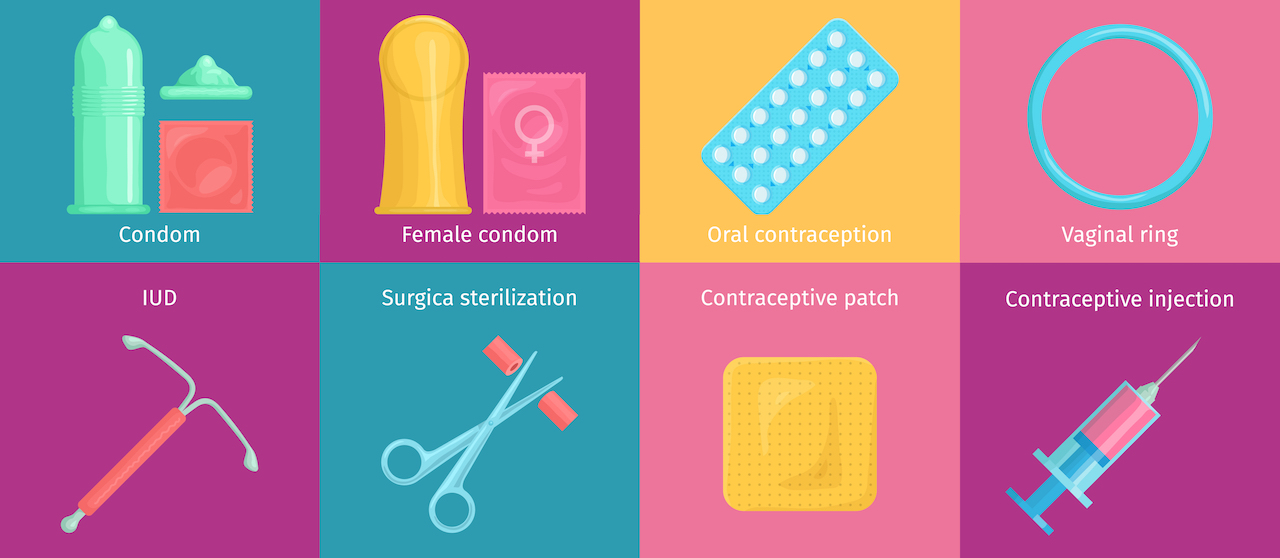Today, there are more options than ever to prevent pregnancy – and stay sexually safe. With guidance from your doctors and the many options to choose from, you can go for a birth control of your choice that will fit your budget and lifestyle.
The job of birth control is to keep the sperm and egg apart during sexual intercourse. Here’s what you need to know about the most popular methods. Remember, contraceptives don’t protect you from sexually transmitted diseases and HIV/AIDS. So, it’s still a good idea to always use a condom as well.
| Method | How it works | Good to know |
| Implant | A small plastic rod is inserted under the skin of your upper arm. It releases a hormone called progesterone into your body. The hormone thickens the mucous of the neck of the womb to prevent sperm from entering. It prevents ovulation (stops eggs from leaving your ovaries) and thins the lining of the womb so it’s not able to support a fertilised egg.
|
· It’s 99% effective within the first seven days of insertion.
· You can have the implant for up to three years and it’s generally safe for most women to use. · Once it’s in, you don’t have to worry about a daily or monthly routine for your next contraceptive dose. · There could be some side-effects like bruising, occasional soreness, irregular bleeding, headaches, nausea, and acne.
|
| The patch | The thin, beige plastic patch releases hormones through the skin to prevent pregnancy. It can be placed on your buttocks, abdomen, and arm.
|
· It’s about 92-99% effective.
· It’s generally safe, convenient, discreet, and doesn’t disrupt sex. This method is also easier for women who have trouble swallowing pills. · The side-effects may include your period flow being lighter or irregular. With generally no risks to using this method, there’s a slight risk of developing blood clots. Your oestrogen levels are higher and this could lead to weight gain, bloating, water retention, and other health issues.
|
| The pill | The hormones in the pill stop eggs from developing, therefore there is no egg released from the ovary.
|
· Taken daily at a specific time, it can give you 99% birth control.
· The pill does more than prevent pregnancy, but has other health perks too. It helps and reduces acne, menstrual pain, iron deficiency, and bone thinning. It also lowers the risk of ectopic pregnancy (a pregnancy outside of the uterus, which can damage organs and cause life threatening blood loss). · You will have to take the pill every day at the same time. · It may change the level of your sexual desire too. · Weight gain may result because of fluid retention and not from the actual pill.
|
Before you choose your option, know that some digestive disorders make it difficult for your body to maintain an oral birth control (like pills). Certain antibiotics can also make your birth control ineffective, so talk to your doctor before using any new medications.
Other methods include:
- Vaginal ring
- Cervical cap
- Condom
- Diaphragm
- Female condom
- IUD
- Abstinence
- Spermicide
- Vasectomy
- Sterilisation
Check with your doctor to see what may be suitable for you.
References
- https://www.plannedparenthood.org/learn/birth-control/birth-control-implant-implanon
- http://www.news-medical.net/health/Advantages-and-Disadvantages-of-the-Contraceptive-Implant.aspx
- http://www.familyplanning.org.nz/advice/contraception/contraceptive-implant
- http://www.nhs.uk/Conditions/contraception-guide/Pages/contraceptive-implant.aspx
- https://www.verywell.com/the-ortho-evra-patch-906869
- https://www.plannedparenthood.org/learn/birth-control/birth-control-patch/how-do-i-use-birth-control-patch
- http://www.news-medical.net/health/Advantages-and-Disadvantages-of-the-Contraceptive-Patch.aspx
- http://www.familyplanning.org.nz/advice/contraception/combined-oral-contraceptive-pill
- http://www.nhs.uk/Conditions/Ectopic-pregnancy/Pages/Introduction.aspx
- http://www.medicalnewstoday.com/articles/290196.php
- http://www.nhs.uk/Conditions/contraception-guide/Pages/contraceptive-injection.aspx
- http://www.emedexpert.com/compare/birth-control-advantages.shtml
- http://www.healthline.com/health/birth-control-pills#benefits6
- https://patient.info/health/contraceptive-injection

